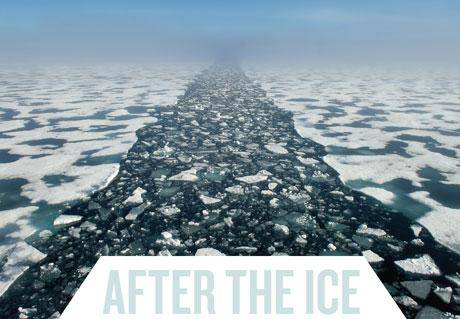Special issue on the Arctic: After the ice
 international |
environment |
other press
international |
environment |
other press  Saturday October 15, 2011 19:32
Saturday October 15, 2011 19:32 by Climate Student
by Climate Student
As the Arctic thaws, can science help to chart a sustainable
Nature has a special issue on the retreat of the Arctic Ice. Here are extracts from some articles.
Last winter, parts of the Canadian Arctic basked in record-breaking warmth. In the town of Coral Harbour, at the mouth of Hudson Bay, temperatures rose above freezing for a few days in January for the first time ever. Across the Arctic, extreme climate conditions are becoming the norm, even as the region faces other profound changes, such as the growing political power of indigenous peoples and the race to extract mineral resources (see page 172).
This week, Nature examines how these changes are affecting scientific access to the north (see page 174), and what scientists should do to keep Arctic development green (see page 179) and peaceful (see page 180). Some are calling for international regulations to safeguard the environment as ship traffic increases (see page 157). Both research and development need to consider the views of local peoples, and scientists are learning how to do so (see page 182). Locals can provide insight into environmental changes; scientists might help them to be heard.
http://www.nature.com/news/2011/111012/full/478171a.html
Redrawing the Arctic map: The new north
The Arctic covers around 5% of the planet's surface, but it is capturing a disproportionate amount of attention. With temperatures rising at twice the global rate, the region's summer sea ice is shrinking rapidly, making access easier than ever before. At the same time, countries are racing to claim parts of the Arctic's sea floor and the vast deposits of hydrocarbons that lie beneath it.
Disappearing sea ice
Since satellite observations started in 1979, the September sea-ice extent has declined by 12% per decade, and the past 5 years have marked the lowest on record. The ice cover is thinning (see graph), making it more vulnerable to warmer temperatures. Forecasts by climate models (see graph) suggest that summer sea ice will largely disappear in the second half of the century, but the current rate of ice loss exceeds the models' forecasts, suggesting that ice-free conditions could arrive sooner.
http://www.nature.com/news/2011/111012/full/478172a.html
Scientific challenges in the Arctic: Open water
As the ice melts, fresh obstacles confront Arctic researchers.
Daniel Cressey
Last month, US researchers took a 4,000-tonne gamble when they steered the Marcus G. Langseth through the Bering Strait and into the Arctic Ocean. The 72-metre research vessel was not built to plow through ice, so it had never ventured that far poleward before.
But the rules are changing quickly in the new north. Managers at the US National Science Foundation (NSF), which owns the ship, decided to send the Langseth into the Arctic after reviewing satellite images that showed that the intended survey area in the Chukchi Sea had been largely clear of ice for four of the past five summers.
In an e-mail to Nature during the cruise, its principal investigator, Bernard Coakley, said: "We are rolling the dice a bit to take her up north." But the bet paid off for Coakley, a marine geologist at the University of Alaska Fairbanks. Sea-ice coverage was at near-record lows this summer, and the Langseth — due back in dock this week — has not encountered any troubling ice.
With the Arctic warming roughly twice as fast as the rest of the globe, there is more need than ever to monitor the changing conditions there. And the retreating summer sea ice is opening up new options for scientists who want to explore the once difficult-to-reach Arctic waters, allowing them, for example, to use vessels other than icebreakers.
http://www.nature.com/news/2011/111012/full/478174a.html
More links at: http://www.nature.com/news/2011/111012/full/478171a.html
